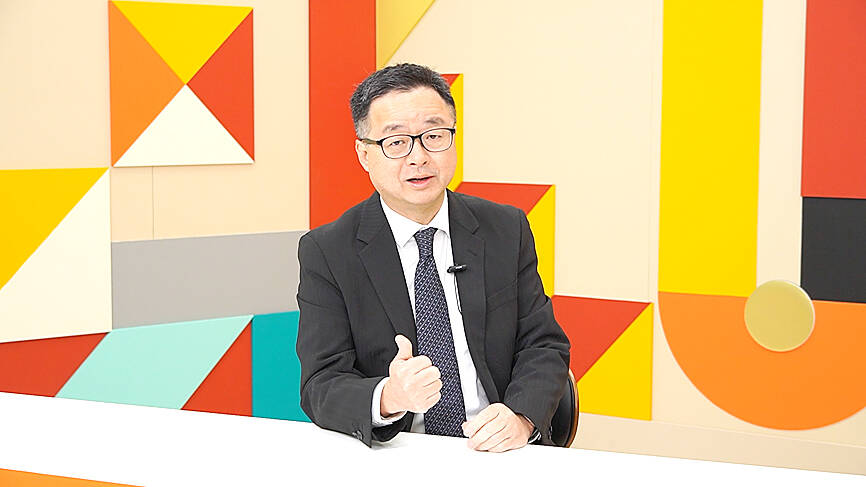The Chinese Communist Party (CCP) uses a combination of soft and hard methods to divide Taiwanese, Straits Exchange Foundation (SEF) Vice Chairman Luo Wen-jia (羅文嘉) said.
The CCP treats targets differently, luring those who can be won over to sow division, Luo said in an interview with the Liberty Times (sister paper of the Taipei Times) on Thursday.
The “soft” approach includes “united front” efforts, such as exchanges for religious groups, academics and the youth, and offering business opportunities to Taiwanese businesspeople, he said.

Photo: Chen Chia-jui, Taipei Times
“They show people scenic mountains and rivers, and talk about a shared history and culture in a bid to confuse people, saying that we are part of the same Chinese nation,” Luo said. “The CCP claims that there is only one China, and that ‘China’ is the People’s Republic of China [PRC], not the Republic of China.”
The “hard” methods include China’s military drills near Taiwan, using military aircraft, ships and coast guard vessels to continuously cross the median line of the Taiwan Strait and pressuring Taiwan’s government, he said.
China engages in those drills frequently, but stops short of a military seizure or blockade to cause fear and undermine Taiwanese’s will to resist, Luo said.
“It is a way of squeezing Taiwan to suffocate. The ultimate goal is to force Taiwan to accept China’s political demands and conditions, and accept becoming a part of the PRC,” he said. “We have achieved democracy, economic achievements and scientific progress through endless effort and sacrifices. Should we give all of that up and surrender, accepting to be ruled by the PRC?”
Since most Taiwanese would be unwilling to do so, Taiwan must seek balance and use the economy as a bargaining chip, he said.
Taiwan’s high-tech industry has an important position in the global supply chain, and its strength in semiconductors has made it an indispensable part of the world’s industrial division of labor, Luo said.
China is aware of Taiwan’s strengths, and looks for ways to disrupt the supply chain and steal its technology, he added.
“There have been many cases in the US where the CCP used spies, [such as] Chinese students or local residents who work in the US tech industry, and have them steal technologies for China,” he said. “It has also circumvented export controls by purchasing Taiwanese products through disguised subsidiaries.”
Many of the exchanges that the CCP invites Taiwanese on are aimed at stealing technology and poaching talent, Luo said, adding that the nation must bolster defense and protection to avoid the loss of its chips and technology.

The manufacture of the remaining 28 M1A2T Abrams tanks Taiwan purchased from the US has recently been completed, and they are expected to be delivered within the next one to two months, a source said yesterday. The Ministry of National Defense is arranging cargo ships to transport the tanks to Taiwan as soon as possible, said the source, who is familiar with the matter. The estimated arrival time ranges from late this month to early next month, the source said. The 28 Abrams tanks make up the third and final batch of a total of 108 tanks, valued at about NT$40.5 billion

Two Taiwanese prosecutors were questioned by Chinese security personnel at their hotel during a trip to China’s Henan Province this month, the Mainland Affairs Council (MAC) said yesterday. The officers had personal information on the prosecutors, including “when they were assigned to their posts, their work locations and job titles,” MAC Deputy Minister and spokesman Liang Wen-chieh (梁文傑) said. On top of asking about their agencies and positions, the officers also questioned the prosecutors about the Cross-Strait Joint Crime-Fighting and Judicial Mutual Assistance Agreement, a pact that serves as the framework for Taiwan-China cooperation on combating crime and providing judicial assistance, Liang

A group from the Taiwanese Designers in Australia association yesterday represented Taiwan at the Midsumma Pride March in Melbourne. The march, held in the St. Kilda suburb, is the city’s largest LGBTQIA+ parade and the flagship event of the annual Midsumma Festival. It attracted more than 45,000 spectators who supported the 400 groups and 10,000 marchers that participated this year, the association said. Taiwanese Designers said they organized a team to march for Taiwan this year, joining politicians, government agencies, professionals and community organizations in showing support for LGBTQIA+ people and diverse communities. As the first country in Asia to legalize same-sex

MOTIVES QUESTIONED The PLA considers Xi’s policies toward Taiwan to be driven by personal considerations rather than military assessment, the Epoch Times reports Chinese President Xi Jinping’s (習近平) latest purge of the Chinese People’s Liberation Army (PLA) leadership might have been prompted by the military’s opposition to plans of invading Taiwan, the Epoch Times said. The Chinese military opposes waging war against Taiwan by a large consensus, putting it at odds with Xi’s vision, the Falun Gong-affiliated daily said in a report on Thursday, citing anonymous sources with insight into the PLA’s inner workings. The opposition is not the opinion of a few generals, but a widely shared view among the PLA cadre, the Epoch Times cited them as saying. “Chinese forces know full well that